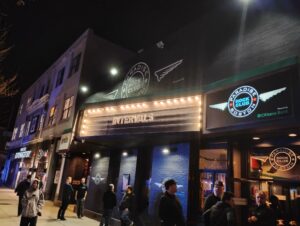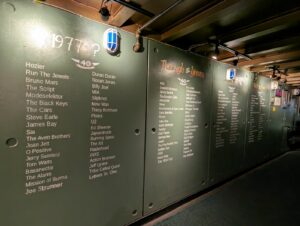By Colin McCandless
Contributing Writer
BOSTON – The legendary Paradise Rock Club in Boston is nearing its 50th birthday. A 999-person capacity venue located on 967 Commonwealth Ave. near multiple colleges and universities, it has hosted many famous bands and influential musicians from all rock genres and more, from around the world. It books national touring acts and popular local bands, and the names that have adorned its marquee over the decades comprise a Who’s Who list of renowned rockers.

Photo/Courtesy of the Paradise Rock Club
Launched by BU graduate
Don Law of the Don Law Company launched the Paradise Rock Club in 1977, originally called the Paradise Theater. According to Paradise Rock Club general manager Bill Guerra, Law, a Boston University graduate, noticed the need for music venues in the area and figured the local student population would flock to patronize the shows. His assumption proved correct.
Law’s entertainment business is now known as Crossroads Presents, a locally owned and operated Boston-based concert promoter and joint venture with Live Nation that owns several Boston music venues in addition to the Paradise including MGM Music Hall Fenway, Brighton Music Hall, House of Blues Boston and Orpheum Theatre.
Throughout its history, the primary focus has been, as the name implies, rock, but the Paradise has offered a fairly eclectic mix of genres during that entire time, stated Guerra. That includes country, hip hop, punk, indie, alternative, grunge and even some jazz over the years, such as guitarist and composer Pat Metheny of the Pat Metheny Group.
Iconic bands
Even during its formative years, the Paradise brought in musicians and bands that would go on to become iconic names in the industry. Tom Petty, Aerosmith, The Cars, Meatloaf, Peter Gabriel, Blondie, Cheap Trick, AC/DC, Iggy Pop, Lou Reed, James Taylor, The Police and the Talking Heads all played there in the 1970s. The club displays a photo of James Taylor performing on stage with Carly Simon that was taken during their April 18, 1978 concert. The 80s saw the piano man Billy Joel, Guns N’ Roses, INXS, Joan Jett and the Blackhearts, Duran Duran, Sinead O’Connor, Glenn Frey, The Pretenders and the Red Hot Chili Peppers grace its stage.

Photo/Wikimedia Commons
A photographer contributed a trove of pictures that are hanging on display in the club’s front lounge area which highlight some of the legendary artists who have played the Paradise. Additionally, their “Wall of Fame” in the main entry hall to the club features an extensive list of the musical acts past and present who have graced its stage, from the Pixies and Tribe Called Quest to Tom Waits and Dropkick Murphys.
Another claim to fame for the Paradise: U2 played one of their earliest United States gigs there in December 1980. “Don Law gave them an opportunity,” said Guerra. “They weren’t well known at the time.” U2 even signed a poster thanking Don for taking a chance on them. The front lounge photo collection features a picture of Bono singing on stage at the Paradise in the 1980s.
One fascinating historical tidbit: folk musician Livingston Taylor, the brother of James Taylor, headlined the first-ever show at Paradise in 1977. His manager at the time was none other than Don Law, according to Guerra.
Approaching 50 years of rock shows
A half-century is a long time for a music venue to continuously operate. So why has the Paradise survived the test of time and kept going strong for nearly 50 years, when so many other clubs from that era or beyond (The Rat, The Channel, etc.) have closed down?
Guerra cited several potential reasons for the Paradise’s longevity. “It’s such a dicey business. There’s so many factors involved. You have a legendary status, and that certainly helps.”
Additionally, when it comes to concert spaces, size definitely matters. “It’s a perfect size for bands ready to take off and go to the next level,” he said.
Accommodating just shy of 1,000 people, the Paradise is designed “so wherever you are, you feel like you’re close to the stage,” Guerra explained, creating an interactive and intimate vibe for the audience. He added that people can come “see really established bands and feel almost like they are part of the show.”

Photo/Courtesy of the Paradise Rock Club
Guerra said the way they treat their musicians is another factor that has contributed to the venue’s long-term success. “We cultivate a very welcoming atmosphere for bands,” he asserted. “We try to treat everybody as the most important show we have.” This in turn leads bands to want to return to Paradise and play there again. “Some use the Paradise as a launching pad to success and go on to play larger venues like the House of Blues,” said Guerra.
Family vibe
It doesn’t hurt that over the years a number of their employees have been musicians, typically individuals who are no longer touring or performing regularly and work at the Paradise to stay connected to the music scene without having to endure the rigors of the road. They can relate to their fellow musicians and understand their needs.
There are also important figures whose longtime dedication and commitment to fostering the club’s reputation spanned decades. The Paradise’s former production manager Billy “Bud” McCarthy worked there for 38 years before his recent retirement. “Bands knew who he was,” recounted Guerra. “He helped establish the positive image of the club.”
“It’s a combination of things. We’ve always tried to cultivate a welcoming, family vibe.” He said Paradise staff recognize that people are here to see a show and enjoy a band they love and “our job is to make sure they have a great experience.”
He credits Law, who is well-connected in the Boston area, with building the Paradise brand and molding it into the iconic place it is today. “Don Law did an amazing job,” said Guerra. “A lot of people loved him and loved working with him. Now being associated with Live Nation is a big help that put us on the map in a big way.”
RELATED CONTENT:
The Channel nightclub was one of Boston’s top live music spots in the ’80s
Boston’s legendary rock club ‘The Rat’ is still remembered fondly
Spit was a Boston nightclub with an attitude












